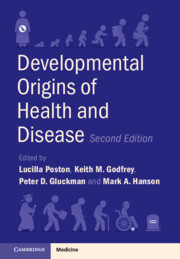Book contents
- Developmental Origins of Health and Disease
- Developmental Origins of Health and Disease
- Copyright page
- Contents
- Contributors
- Preface
- Section I Overview
- Section II Exposures Driving Long-Term DOHaD Effects
- Section III Outcomes
- Chapter 10 Cardiometabolic and Renal DOHaD Outcomes in Offspring of Complicated Pregnancy
- Chapter 11 Developmental Origins of Chronic Respiratory Diseases
- Chapter 12 Early Life Adversity and Female Reproductive Outcomes
- Chapter 13 Developmental Programming of Ageing Induced by Poor Maternal Nutrition
- Section IV Mechanisms
- Section V Interventions
- Section VI Public Health and Policy Implications of Interventions
- Index
- References
Chapter 10 - Cardiometabolic and Renal DOHaD Outcomes in Offspring of Complicated Pregnancy
from Section III - Outcomes
Published online by Cambridge University Press: 01 December 2022
- Developmental Origins of Health and Disease
- Developmental Origins of Health and Disease
- Copyright page
- Contents
- Contributors
- Preface
- Section I Overview
- Section II Exposures Driving Long-Term DOHaD Effects
- Section III Outcomes
- Chapter 10 Cardiometabolic and Renal DOHaD Outcomes in Offspring of Complicated Pregnancy
- Chapter 11 Developmental Origins of Chronic Respiratory Diseases
- Chapter 12 Early Life Adversity and Female Reproductive Outcomes
- Chapter 13 Developmental Programming of Ageing Induced by Poor Maternal Nutrition
- Section IV Mechanisms
- Section V Interventions
- Section VI Public Health and Policy Implications of Interventions
- Index
- References
Summary
It is now over thirty years since epidemiological studies revealed a relationship between low birth weight and subsequent risk of developing traditionally adult-onset diseases, such as type 2 diabetes, cardiovascular and renal disease. Initial focus was directed towards the importance of fetal undernutrition. However, it is now recognized that a range of other in utero adverse exposures including chronic fetal hypoxia, maternal over-nutrition and maternal stress can also lead to increased risk of cardio-metabolic and renal diseases in later life. Animal models, including those using non-human primates, sheep and rodents have been critical in demonstrating causality of relationships and helped to define underlying mechanisms, such as epigenetic programming of gene expression and oxidative stress. As the field moves forward in the coming years, these mechanistic studies will help to identify rational intervention strategies to reduce the developmental programming of cardiometabolic and renal dysfunction in suboptimal pregnancy.
- Type
- Chapter
- Information
- Developmental Origins of Health and Disease , pp. 85 - 99Publisher: Cambridge University PressPrint publication year: 2022
References
- 2
- Cited by

